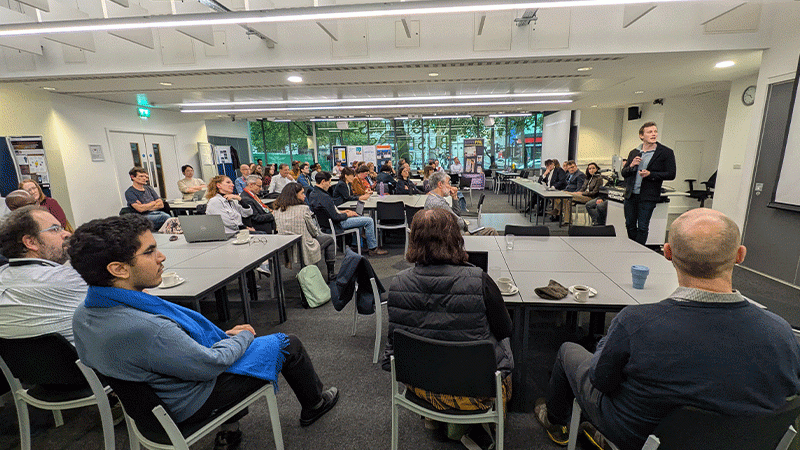The University of Westminster recently hosted a welcome event to celebrate the launch of the University’s new Artificial Intelligence (AI) Network. The university-wide research centre brings together diverse expertise in AI and data science to promote interdisciplinary collaboration, boost external partnerships and support cutting-edge, responsible AI research that addresses real-world challenges.

Held on 22 October on Westminster’s Marylebone Campus, the event brought together students, colleagues and industry experts to explore the latest trends and opportunities in AI and showcase the University’s growing research strengths in the field.
The evening opened with a welcome from Co-leaders of the network Dr Alexander Bolotov, Reader in Computer Science and Engineering, and Dr Tom Nadarzynski, Reader in Social Sciences, followed by addresses from Deputy Vice-Chancellor of Research and Knowledge Exchange Professor Andrew Linn. Together they highlighted the University’s commitment to advancing AI research to support social good, creativity and innovation.
The event kicked off with a keynote panel discussion on AI trends and opportunities, which was chaired by Reader in Computer Science Dr Barbara Villarini and Computer Science Lecturer Dr Tom Oliver and featured a range of thought leaders from academia and industry. Their discussions explored topics such as AI ethics and enterprise innovation, generative AI, creative computing and the cognitive science of meaning.
Following the panel, attendees heard research pitches from students and colleagues who presented innovative project ideas and poster proposals for the AI Network’s upcoming research project proposals competition. The selected proposals will be matched with a mentor and support from Westminster’s Research and Knowledge Exchange Office.
One highlighted project was a web-based immersive sign language platform that empowers teachers to create sign-language content and transforms it into interactive games for students, additionally providing real-time feedback on sign performance. The proposal, presented by Timur Martinez-Mukimov, a PhD researcher in Computer Science and Dr Daphne Economou, aims to assist custom sign content creation for educators. Their research compares various learning experiences to measure engagement, motivation and learning outcomes in sign language education.
The AI Research Showcase 2025 followed, featuring researchers presenting cutting-edge AI projects and creative applications that opened up new opportunities for cross-disciplinary networking and collaboration. The day concluded with an AI-powered reception, where creative tools such as ChatGPT sparked conversation and imagination, and guests cast their votes for the best research pitches and the new AI Network logo.
One of the invited panelists, Edward Frank Morris, CEO and Lead Prompt Engineer of Enigmatica, said: “I left the event impressed, mostly because it was filled with people actually building instead of performing innovation theatre for applause. It reminded me that AI is only as sharp as the minds wielding it, and the real breakthrough happens the moment you realise the tool isn’t transforming the work, it’s transforming the worker.”
Dr Alexander Bolotov, Reader in Computer Science and Engineering, added: ““The formal establishment of Westminster AI Network in May was the recognition of one of Westminster research strengths. Our recent launch event has demonstrated very high level of engagement across all Westminster colleges and schools, bringing 81 participants. Moreover, the launch event has brought two new partnerships, with StarPal.AI and On the Mend, which have started working on joint applications for external funding. Overall, since July, the Westminster AI Network has led, supported or partnered in eight applications for external funding.”
The Network directly contributes to the United Nations Sustainable Development Goals (SDGs) 9: Industry, Innovation and Infrastructure, 10: Reduced Inequalities and 17:Partnerships for the Goals. Since 2019, the University of Westminster has used the SDGs holistically to frame strategic decisions to help students and colleagues fulfil their potential and contribute to a more sustainable, equitable and healthier society.
Learn more about Data Science and Informatics courses at the University of Westminster.






